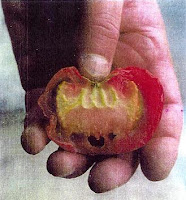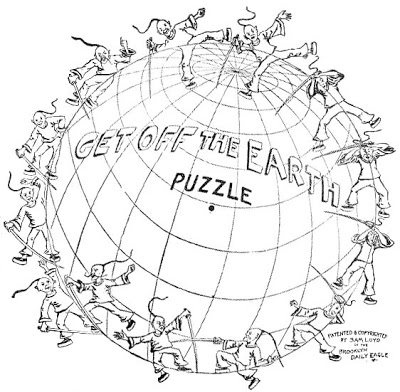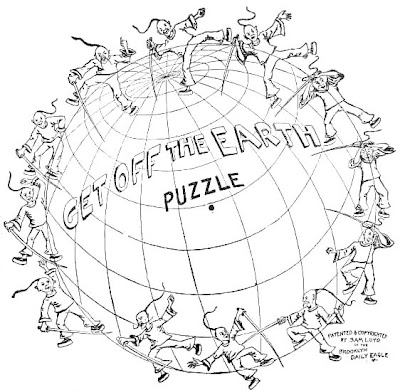I’ve been tagged by snowqueen to answer these questions.
1. How did the world and all that is in it come into being?
My son says that it was barfed up by Burunfa, the Great Sky Dog. Dinosaur fossils are just stuff that Burunfa had eaten. He also says that if you do what Burunfa says, you get to go Barunfa-land, which is a really great place. Also, he says that he is the sole emissary of Burunfa, and you have to do what he says, including giving him money and chocolate. He could be wrong, but with so much at stake, can I afford to take the chance? Or perhaps he’s just a clever scam artist, like everyone who runs a religion.
You should probably ask someone who knows about physics.
2. What is reality in terms of knowledge and truth?
Reality is that which an idealised scientific community agrees is true, over the very long term.
3. How does/should the world function?
I don’t have an answer for this. I don’t have any special understanding of how the world works, or else I’d be better at navigating around its systems.
4. What is the nature of a human being?
Human beings are bundles of desires, preferences, and memories. They have generally good intentions and brains that make reasonably good decisions when conditions are not too complex. Otherwise, they fall victim to short-term gratification, perceptual bias, and paralysing fear. The antidote to these less-than-helpful behaviours is to behave ethically, use the scientific method, and calm the fuck down.
5. What is one’s personal purpose of existence?
I used to think there was a purpose that was the same for everyone, and if only we could find that purpose in life, then we could all just do it and be happy.
Now I think it’s more individuated. My purpose in life is to raise my children, do well in my work, and have loving relationships.
Rather than ask, “What’s the purpose of existence?”, I’d like to ask, “What purpose are you bringing to your existence?” It may not be out there to be found. You may have to make it.
6. How should one live?
One should survive, and seek ethical pleasure, in that order.
7. Is there any personal hope for the future?
If by ‘personal hope’ you mean ‘continual existence as an individual after your death’, then no, there is no evidence to suggest that this is the case. Hope is in humanity and in the monuments you create and leave behind.
8. What happens to a person at and after death?
As an LDS missionary, I used to teach that we had a spirit inside us that went to the spirit world. I even used the metaphor of a hand in a glove — the glove dies, but the hand lives on (wiggle fingers). But that’s just a metaphor, not evidence, and I was wrong to teach it.
I might just as well have said that we’re like a lightbulb. A light bulb is a machine for making light, but once the filament goes, the machine doesn’t work anymore. But we don’t treat the light like some kind of entity that persists after the bulb burns out. Our bodies are like machines for living, and our brain is the filament.
Now maybe that’s wrong too, but it’s just as good a metaphor as the spirit idea, and I think it’s backed up by evidence better.
9. Why is it possible to know anything at all?
Your question presumes that we can. In fact, it is very difficult to say that we know something.
In the church I used to go to, they would perform a kind of communal reinforcement ritual every month. People would tell each other, “I know the gospel is true.” After 35 years, it really grated on my ears every time I heard it. They did not know it was true, they were merely certain, which is different.
To say that a claim is true, we need to have factual evidence for that claim. Even then, we may need to adjust the claim if new and better evidence comes in. So the things that we ‘know’ are true will all probably be disproven or updated beyond recognition in 200 years’ time. What we should be saying is not ‘I know X is true’ but ‘At this point, the best evidence we have suggests that we can be pretty certain that X is the case.’
That doesn’t give much room for certainty, does it? Welcome to the universe.
10. How does one know what is right and what is wrong?
Let’s say you have two tribes of humans. In one tribe, they never help each other. In the other, they sometimes do. The second tribe will do better at surviving, since two people together can do things that one person can’t.
We’re like the second tribe. We’ve survived long enough that human evolution has given us some traits, like compassion and altruism, that help us to live together in a somewhat orderly and helpful fashion. When we feel that something is right or wrong, we may be drawing upon our evolutionary heritage.
11. What is the meaning of human history?
Human history is an enormous bunch of cases where things happened. We use them to figure out what’s going to happen in the future, and how to stop it.
12. What does the future hold?
My future holds love, some sadness, time with people I love, good food, and a lifetime of striving for the good. I hope your future is good to you.








Recent Comments